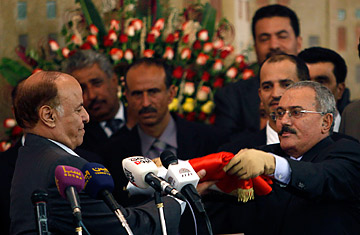
Yemen's new president Abd-Rabbu Mansour Hadi (L) receives the country's national flag from former president Ali Abdullah Saleh during a ceremony at the presidential palace in Sanaa Feb. 27, 2012.
Set amongst a bare expanse of fields and windswept pastureland on the outskirts of Yemen's capital, Ali Abdullah Saleh's palace compound is a bizarre-looking domicile. With its maze of banquet halls, libraries and prayer rooms interlinked by leafy courtyards and rose gardens, it feels more like a monastery than a presidential residence. That is, until you spot the bulletproof cars and growling German Shepherds tethered to tree trunks.
Towards the end of February last year Saleh's press secretary summoned me, and a small group of other foreign journalists, to the palace for a speech by the president. The small, scattered protests rippling across Yemen in the wake of Egyptian President Hosni Mubarak's downfall were steadily gaining momentum. Braving the regime's batons and bullets, a huddle of students camped in red tents outside the gates of Sana'a University were marshaling ever-larger and noisier demonstrations against Saleh's 33 year incumbency.
Seated in plush, gold-crested armchairs we listened as a brazen Saleh harangued those revolting against him. His bejeweled fingers gripping the sides of the podium, he barked gruff ripostes into a tangle of microphones, refusing to resign and dismissing those rallying against him as a "small and unreasonable minority." He ended the speech by likening the rising dissent in his country to a disease sweeping through the region: "This is a virus and is not part of our heritage or the culture of the Yemeni people," he said to a scattered round of applause.
On Monday Feb. 27, just over a year later, a collection of party members, military generals and journalists were back in the palace hall, preparing for a very different type of performance: a farewell party. Dressed in a black suit and a purple tie, Saleh looked tired and frail, a shadow of his former self. His hands, perched delicately on the rostrum in front of him, were concealed behind a pair of yellow velvet gloves, protecting the burns he'd sustained when a bomb ripped through his presidential mosque in June.
"We call on all the sons of the nation to stand together alongside the political leadership to rebuild the legacy of this crisis," he said, as a mustachioed chaperone turned the pages of his speech for him. "I now hand over the banner of the revolution, the republic, freedom, and security ... to safe hands," said Saleh, passing a carefully-folded tricolor flag to the man next to him. "We support the new president who is in favor of security and stability. The responsibilities are great, but we hope that he will tackle the repercussions of the crisis... I would like to assure you President Hadi that we stand by you in good times and bad times."
After a year of mass protests, bloodshed and political wrangling, Yemen's vice president, Abd Rabbo Monsour Hadi, 66, was swept into office last week in a referendum-style vote, the fruit of a U.S.-backed power transfer deal, hammered out by Yemen's Gulf neighbors in November, which saw Saleh step down in exchange for immunity from prosecution. Though it avoids both genuine elections and accountability for the regime's brutal crackdowns on protesters, it has been touted by regional and western powers as a triumph of diplomacy that may have spared Yemen from a Syrian-style descent into violence.
Heeding politician's calls for "a fresh start" and the "turning a new page," millions of Yemenis filed into polling stations last week to thumbprint one-man ballots rubber-stamping Hadi to oversee a two-year political transition that would include parliamentary elections, a new constitution and restructuring of the country's fractured military. But the sense of optimism reverberating around the capital last week is already starting to fizzle out. As the fog lifts, a fragile and fractured image of a post-Saleh Yemen is starting to emerge.
On Saturday Feb. 25, hours after Yemen's new leader was sworn in at a cheery parliamentary session in the capital, a suicide-bomber drove a Toyota Hilux packed with explosives into the wall of a presidential palace in the southeastern port of Mukalla. The attack, which killed 21 soldiers and an elderly woman, underscores the enormity of the task facing the former army commander, who inherits a country on the brink of famine, beset by violent separatist movements, crumbling infrastructure, mutinous troops, grand corruption and a bleeding economy.
